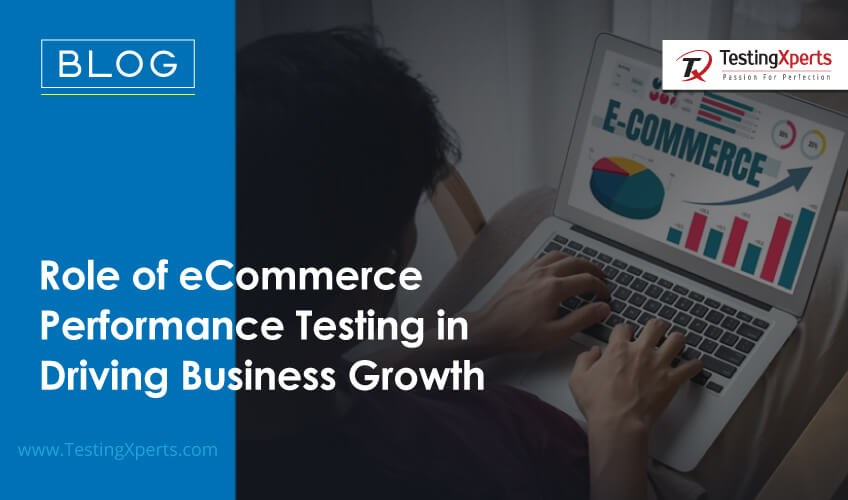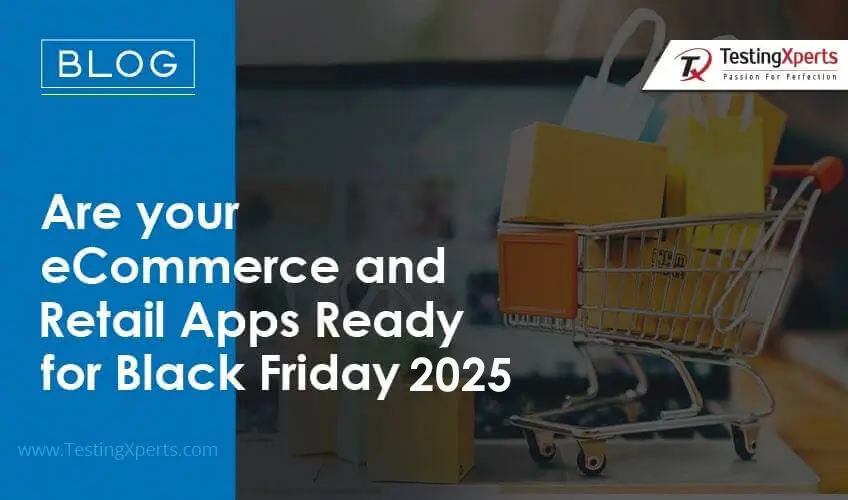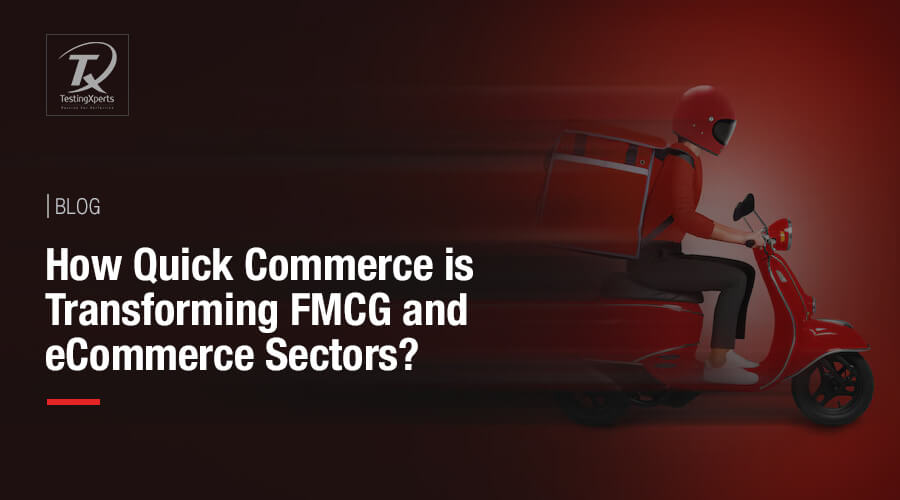
- QCommerce vs. eCommerce Apps
- Leveraging Cloud Computing in QCommerce
- QCommerce Changing FMCG Landscape
- Examples of QCommerce Apps
- Why Partner with Tx for Q-commerce App Testing?
- Summary
According to a report by Elara Securities, the sales share from quick commerce platforms for large FMCG compares might double shortly. These platforms’ user experience is also forcing eCommerce businesses to offer greater discounts. This transformation is due to strategic changes in business operations and consumer interactions. However, the eCommerce sector witnessed exponential growth over the past few years, with its sales expected to reach $7.4 trillion by 2025. This growth could also be due to quick commerce attributes. As businesses integrate QCommerce platforms like Amazon Prime Now, DoorDash, etc., they can see significant changes in sales figures and market dynamics.
The FMCG and eCommerce sectors always look for ways to innovate and align with evolving consumer expectations, such as quick response, speed, efficient cost, and better quality. Quick commerce is like a critical transformation in consumer retail, allowing businesses to expand their horizons in new markets and demographics.
A Brief Overview of Quick Commerce
Quick commerce, or QCommerce, is an upgraded form of eCommerce that focuses on delivering products and services in the shortest time possible. It allows businesses to address the demand for instant user satisfaction by utilizing logistics, infrastructure, and local warehouses to deliver products within minutes. The backend operation of the QCommerce app is optimized by mobile technology, gig economy platforms, and routing algorithms. Businesses also use automated technologies like robots and drones for last-minute deliveries.
QCommerce vs. eCommerce Apps
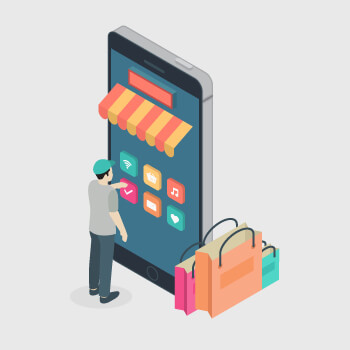
| Feature | QCommerce Apps | eCommerce Apps |
| Delivery Speed | Expected delivery time within minutes to an hour. | The delivery time ranges from a couple of days to more than a week. |
| Product Range | Focuses on daily usage items and essential and urgent items. | Offers a wide range of products. |
| Operational Model | Utilize local dark stores or warehouses for fast delivery. | Depends on sellers and centralized warehouses. |
| Technology Used | Relies heavily on advanced logistics and real-time tracking. | Utilize standard logistics technology. |
| Order Volume | Handles smaller and more frequent orders only. | Deals with larger order volumes. |
| Consumer Behavior | Immediately Fulfills customer needs and impulse purchases. | Cater to planned purchases in bulk quantity. |
| Service Area | Covers urban areas with dense populations. | Wide coverage, including rural areas. |
| Pricing Strategy | Premium pricing approach for faster service. | Competitive pricing with possible discounts. |
| Customer Engagement | High engagement due to quick response time. | Engagement focused on customer support and data. |
Leveraging Cloud Computing in QCommerce
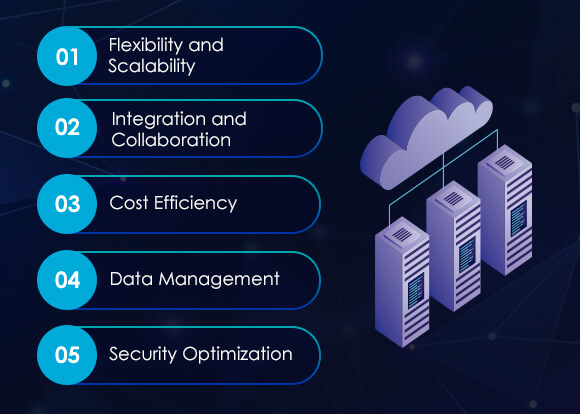
One critical component in QCommerce app development is cloud computing. It allows businesses to handle high volumes of transactions and data with greater accuracy, reliability, and efficiency. Using cloud infrastructure, QCommerce platforms can improve data management, optimize operations, and enhance CX. Here’s how cloud computing affects QCommerce:
Flexibility and Scalability
It enables QCommerce platforms to scale resource consumption based on demand. This is handy during peak shopping periods when web traffic is very high. Cloud services offer flexibility for handling such fluctuations seamlessly and ensure the infrastructure can function well during peak periods without degrading performance.
Integration and Collaboration
The QCommerce platforms benefit from the seamless integrations enabled by the cloud. These platforms can be connected to payment gateways, dark stores, inventory management systems, logistic providers, etc., to enable real-time data processing and smooth coordination. Teams can easily communicate and collaborate more efficiently using cloud-based tools.
Cost Efficiency
It reduces the requirement for extensive physical hardware and lowers operational costs. Businesses developing QCommerce apps can leverage cloud services to avoid upfront costs for buying and maintaining hardware and software. This level of cost efficiency allows businesses to compete more effectively in the QCommerce space.
Data Management
Like eCommerce, QCommerce apps rely on huge datasets, including logistic data, inventory-level data, customer details, transaction details, etc. Cloud platforms offer scalable and secure storage solutions to manage the huge amounts of data QCommerce generates. They also offer robust data storage and processing capabilities, such as ML and cloud-based analytics solutions. It allows businesses to extract valuable insights from the data to optimize the QCommerce supply chain.
Security Optimization
QCommerce handles sensitive user data, including payment details, personal details, addresses, etc. This is why security is a major concern on the QCommerce platform. Cloud computing offers advanced security protocols to protect data from breaches and cyber threats. Cloud service providers offer regular updates and security patches to maintain a secure environment.
QCommerce Changing FMCG and eCommerce Landscape

Currently, 40% of digital sales are occupied by quick commerce, which is expected to rise to 60% as modern trading and eCommerce become costlier for FMCG brands in the near future. The growing popularity of QCommerce also gives direct competition to eCommerce platforms in categories such as packaged foods, apparel, beauty and personal care, and groceries. As QCommerce platforms focus on fast delivery, the traditional business models that FMCG and eCommerce sectors work on will evolve to remain competitive and responsive to market trends. Here’s a detail on how QCommerce is changing the FMCG and eCommerce landscape:
Delivery Speed
QCommerce is setting a new level of delivery speed by allowing vendors to deliver goods within an hour of accepting the order. This significantly raised consumer expectations, pushing FMCG and eCommerce platforms to optimize their delivery systems to keep up.
Customer Expectations
Today’s customers expect the convenience that QCommerce apps offer from online shopping. They expect faster delivery and more flexibility in ordering and returning products. This shift pushes businesses to improve their CX and change their return policies.
Tech Innovation and Adoption
To keep pace with QCommerce platforms, traditional retailers have started adopting new technologies, which include AI-based inventory management systems, data analytics platforms, etc. This allows them to predict consumer buying patterns and optimize their stock levels.
Urban-focused Growth
QCommerce’s major business area is in urban areas where logistics facilitates quick deliveries. It has been a great success, pushing businesses to focus more on urban markets rather than less densely populated areas.
Supply Chain Management Optimization
The QCommerce speed factor has led to innovation in supply chain management. Businesses should invest in dark stores and micro-fulfillment centers within city limits for quicker dispatch and delivery of goods.
Examples of QCommerce Apps
The quick commerce apps cater to the growing need for immediate delivery in online shopping of everything from groceries to electronics within minutes. Let’s take a close look at some of the QCommerce apps that are the main cause of the rapid shift in consumer behavior and tech innovation:

Amazon Prime Now
One of the famous QCommerce apps, Amazon Prime Now offers within-hours delivery for a wide range of items, including groceries, electronics, makeup products, etc. Its integration with local warehouses and dark stores ensures urban areas with access to Amazon services can enjoy fast delivery.
DoorDash
Originally famous as a food delivery company, DoorDash has also expanded its horizon to the eCommerce sector. Its DashMart is a convenience store that delivers groceries and household items within minutes. Its fast delivery service influences its local partnerships and logistics network.
GoPuff
One of the popular QCommerce platforms, GoPuff specializes in delivering household items at reasonable prices. Its website and mobile app allow consumers to order various products, including drinks, personal care items, groceries, etc.
Why Partner with Tx for Q-commerce App Testing?

Quick commerce apps face various challenges, such as maintaining data security, managing high traffic volumes, ensuring rapid and secure transaction processing, etc. These challenges severely impact CX, business ROI, and waver user trust in the brand. This is why robust testing is necessary to ensure your QCommerce app functions as it should without compromising its quality and reliability. Partnering with Tx for QCommerce app testing ensures your app is well-equipped to tackle these challenges effectively.
We conduct different types of performance testing, such as stress tests, spike tests, load tests, isolation tests, soak tests, etc., to ensure your QCommerce platform works as expected, even under heavy loads.
• Our security testing validates for vulnerabilities in your app that can be exploited by cybercriminals. We ensure your QCommerce platform delivers safe and secure transactions, keeping your brand image intact and delivering a great UX.
• Our E2E digital and functional testing ensures your app properly handles alerts, discount offers, and notifications being displayed.
• Our usability testing services ensure your app’s navigation is simple and smooth for the end users.
• We ensure your app complies with accessibility regulations like WCAG, Section 508 & Stanca Act, etc.
Summary
Quick commerce is transforming the FMCG and eCommerce industries by accelerating delivery times and upscaling CX. Businesses can rapidly deliver daily essentials by using technologies like cloud computing and integrating with local warehouses while supporting scalability, cost efficiency, and real-time data processing. However, you must partner with a reliable digital engineering and QA solutions provider like Tx to ensure your QCommerce app solution adapts to faster, tech-driven models to remain competitive. Contact our experts now to learn how we can help with QCommerce app testing services.
Discover more
Get in Touch
Stay Updated
Subscribe for more info



